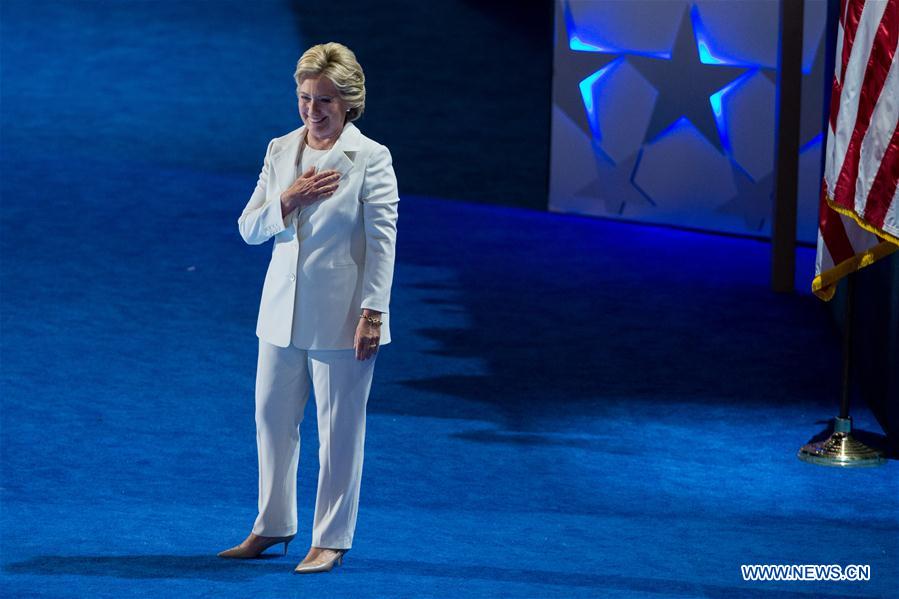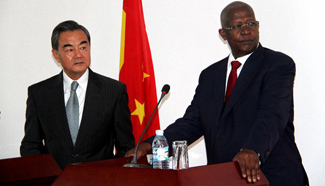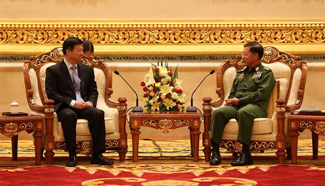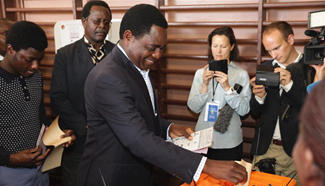
U.S. Democratic Presidential Candidate Hillary Clinton takes the stage on the last day of the 2016 U.S. Democratic National Convention at Wells Fargo Center, Philadelphia, Pennsylvania, the United States on July 28, 2016. Former U.S. Secretary of State Hillary Clinton has formally accepted the Democratic Party's nomination for president and pledged more economic opportunities for Americans and "steady leadership." (Xinhua/Li Muzi)
by Li Ming, Liu Yuchen
NEW YORK, Aug. 12 (Xinhua) -- Although Hillary Clinton has promised to further regulate the U.S. financial industry once elected president, the Democratic nominee is winning broad support from Wall Street in this year's presidential election. Analysts say the reason has little to do with voting for Hillary Clinton as voting against her rival Donald Trump.
Latest statistics from Center for Responsive Politics (CRP), a nonpartisan U.S. research group, shows that owners or employees of hedge funds and private equity firms have given 27.6 million U.S. dollars to pro-Clinton groups or her campaign.
Meanwhile, the same category of donation for Republican nominee Donald Trump is roughly 19,000 dollars.
Among Clinton's Wall Street boosters, J.B. Pritzker, a billionaire and co-founder of U.S. investment firm Pritzker Group, alone has contributed 2.8 million dollars to Priorities USA, a political action committee (PAC) supporting Hillary Clinton.
Pritzker has said openly that he is prepared to do whatever he can do "to make sure that it is Hillary who makes it to the White House and not Trump."
This is a complete change from the last presidential election in 2012 between Republican nominee Mitt Romney and Democratic nominee Barack Obama, when the financial sector showered Romney's campaign with 113 million dollars, leaving few to support his Democratic peer.
"Traditionally, Democrats tended to pose strict regulations on the financial industry, while Republicans would loosen regulations, so Wall Street has always been the voting base for Republican nominees," said Kevin Chen, Founder and Chief Investment Officer of ACM Global Macro Fund LLC, in a recent interview with Xinhua.
However, as Chen noted, Trump, by now known for his abrupt behavior, is much more unpredictable in the eyes of market investors than his Democratic opponent, who has laid out a clear outline for Wall Street reform.
In her acceptance speech at the past Democratic National Convention (DNC), Clinton vowed to never let Wall Street "wreck" Main Street again.
"Wall Street, corporations, and the super-rich are going to start paying their fair share of taxes. Not because we resent success. Because when more than 90 percent of the gains have gone to the top one percent, that's where the money is," she said.
Clinton's tough tongue towards Wall Street at the DNC came after critics repeatedly pointing out that she has received 21 million dollars for giving speeches at Goldman Sachs and other Wall Street firms.
"As a nominee, she has to sound tough towards Wall Street at the convention to attract main street voters, especially the large number of voters who endorse Bernie Sanders," Chen said.
Sanders, a Democratic front-runner, has pledged massive reform within the financial sector such as breaking up the big banks and reinstating the Glass-Steagall Act to separate commercial banking from investment banking.
Meanwhile, Clinton's plans to further reform the industry include imposing a risk fee on the largest financial institutions, holding senior bankers accountable when a large bank suffers major losses, imposing a tax on high-frequency trading and closing the so-called "carried interest" loophole, a provision that allows hedge fund managers to treat fees on their clients' investments as capital gains, which are taxed at a lower rate than ordinary income.
"If Hillary Clinton wins the presidency, hedge fund managers are likely to pay more income taxes. No one likes paying more taxes, but they are also aware that if Donald Trump is elected president, he is likely to support policies that will impair the functionality of U.S. economy," Amra Sabic-El-Rayess, Senior Research Scientist and Assistant Professor of Columbia University, told Xinhua on Wednesday.
Wall Street fears that "Donald Trump is likely to enter another unnecessary costly war. He is likely to continue to act and speak irrationally, offensively, discriminately and abruptly. He is likely to institute policies that will undermine the stability and viability of the economy," said Sabic-El-Rayess, who is also a former employee of Goldman Sachs and a registered Republican that openly endorses Hillary Clinton.
For hedge fund owners, the decision is fairly simple: they would rather pay more income taxes than losing the assets or the businesses that they have established and the wealth they've accumulated at this point, she added.
It seems that the decision has become even simpler after Donald Trump, who has long been criticized by his rivals as lacking policy specifics on economic issues, called for, in his speech earlier this week, "eliminating the Carried Interest Deduction and other special interest loopholes that have been so good for Wall Street investors."











